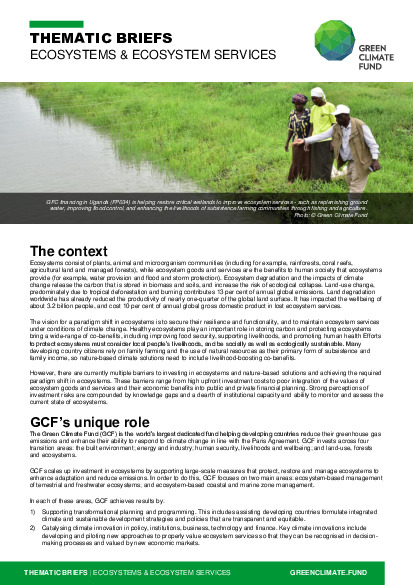Thematic brief: Ecosystems & ecosystem services
Ecosystems consist of plants, animal and microorganism communities (including for example, rainforests, coral reefs, agricultural land and managed forests), while ecosystem goods and services are the benefits to human society that ecosystems provide (for example, water provision and flood and storm protection). Ecosystem degradation and the impacts of climate change release the carbon that is stored in biomass and soils, and increase the risk of ecological collapse. Land-use change, predominately due to tropical deforestation and burning contributes 13 per cent of annual global emissions. Land degradation worldwide has already reduced the productivity of nearly one-quarter of the global land surface. It has impacted the wellbeing of about 3.2 billion people, and cost 10 per cent of annual global gross domestic product in lost ecosystem services.
The vision for a paradigm shift in ecosystems is to secure their resilience and functionality, and to maintain ecosystem services under conditions of climate change. Healthy ecosystems play an important role in storing carbon and protecting ecosystems bring a wide-range of co-benefits, including improving food security, supporting livelihoods, and promoting human health Efforts to protect ecosystems must consider local people’s livelihoods, and be socially as well as ecologically sustainable. Many developing country citizens rely on family farming and the use of natural resources as their primary form of subsistence and family income, so nature-based climate solutions need to include livelihood-boosting co-benefits.
However, there are currently multiple barriers to investing in ecosystems and nature-based solutions and achieving the required paradigm shift in ecosystems. These barriers range from high upfront investment costs to poor integration of the values of ecosystem goods and services and their economic benefits into public and private financial planning. Strong perceptions of investment risks are compounded by knowledge gaps and a dearth of institutional capacity and ability to monitor and assess the current state of ecosystems.
